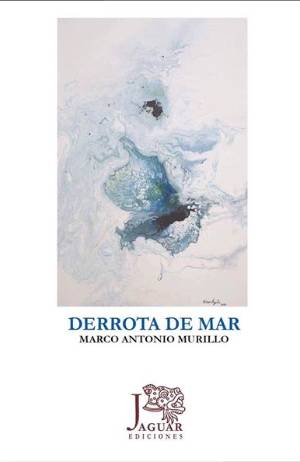Derrota de mar. Marco Antonio Murillo. Colima: Jaguar Ediciones, 2019. 86 pages.
 They say a great deal has been written about water, and they’re right. Questions about the poetic exploration of this element place it in obsolescence, a cliché in the literature of various regions. Nevertheless, poetic designs exist which dignify exploration of the natural elements given that, in all their complexity, anxiety about them still persists.
They say a great deal has been written about water, and they’re right. Questions about the poetic exploration of this element place it in obsolescence, a cliché in the literature of various regions. Nevertheless, poetic designs exist which dignify exploration of the natural elements given that, in all their complexity, anxiety about them still persists.
Marco Antonio Murillo’s latest book, Derrota de mar [Defeat of sea] (Jaguar 2019), establishes a dialogue between a character and water in its many forms and contradictions. In Murillo’s setting, water is another character, a being that takes multiple forms, with its own personality and impulses. Running the risk of anachronism, using such a well-explored element, the author could easily lose his balance. However, he manages to walk the line and deliver up sensible, clear writing.
Given that only around 5% of the oceans are (scientifically) known, have we really run out of ways to describe them? Murillo believes we have not, writing a book built up of several parts that serve as portraits of water. In some moments we see a dangerous, temperamental, destructive sea; in others, we see a calm, smooth river, a fountain of life and a companion.
Exploring water and its faces is not to be taken lightly. Certainly, whoever wants to write about the sea will do so like an oceanographer, knowing they might stumble upon something without knowing what it is. Jacques Cousteau used to say that if he had known what he would find on his submarine expeditions, he wouldn’t have bothered with them. Uncertainly lies behind the impulse to throw oneself into the water, and into its writing.
In this sense, Derrota de mar is the result of a long and careful expedition. Water—sometimes a sea, sometimes a river, and sometimes just water—provides a setting with plenty of simultaneous possibilities: a submerged diver, nesting birds, a carpenter building a ship, someone who finds a message. The sea allows beauty to play and, on occasion, is a participant in calamity. Water unites the creatures of this book and those that exist outside of it.
Various lyrical points are present throughout the book, from which Murillo guides the exploration of language, a place full of sights and sounds. These are recognizable when one reads the works of poets like Saint John Perse and José Carlos Becerra, too. Their echoes jump up like fish and give rise to the construction of the poems.
More than just providing a setting, water is a being with distinct bodies, feelings, and impulses. For example, in “Mascarón de proa” [Figurehead], one reads about the professions that depend upon water and its duality: the carpenter, the diver, the spinner.
“Mar en junio” [Sea in June] is the most contemplative part of the book. It is here that the author writes about what happens in the most visible part of water and the coexistence of the lifeforms that are within and outside of it. In this setting, one questions if everything is being imagined or if it exists in spite of the imagination. The thought exercise in this part serves as a bridge to what comes later.
At the end of the verse collection we read “Carta de relación” [Letter of report], a lengthy poem that tells of what happened after a disaster, just like explorers might write in their logs. Water also destroys and wears down. The hurricane’s path is a metaphor that signals another, impalpable disaster: the way in which two distinct forces of nature erode one another, as happens in the majority of human relationships.
Love is a hurricane and a disaster. Like the hurricane, love enters into intimate settings, destroys our safe places, robs us of everything and defeats us. The only possibility left behind is that of gathering up whatever is left and rebuilding. After the disaster, Derek Walcott would celebrate that we are still alive. The reader is a castaway who has survived the beauty and the many faces of water and love, someone who contemplates defeat and relives battles long since lost.
Derrota de mar is a book that goes further than just exploring its principle element. Marco Murillo’s travel journal is a confrontation between the protagonist and history, but also the reader. Losses should be counted for their value and what they leave within us; in this manner, just like in the oceans, we can dive into and explore the emotions that destroy us.
Irma Torregrosa
Escuela de Creación Literaria del Centro Estatal de Bellas Artes de Yucatán
Translated by Michael Redzich
Irma Torregrosa is a Mexican poet. She earned undergraduate degrees in Social Communication from the Universidad Autónoma de Yucatán (UADY) and Creative Writing from the Centro Estatal de Bellas Artes (CEBA). She received summer grants from the Fundación para las Letras Mexicanas (FLM) in 2011, 2012, and 2015. She was awarded the 2012 Premio Regional de Poesía José Díaz Bollo and the 2017 Premio Hispanoamericano de Poesía San Román. She recently published the verse collection Piélago [Open ocean] (Cuadrivio, 2020).
Michael Redzich is currently studying law at Georgetown University in Washington, D.C. He graduated from the University of Oklahoma in 2017 with a BA in Spanish and a BA in Letters. His interest in Latin American literature sprouted early in his Spanish education, but grew considerably during his time in Buenos Aires, where he lived from 2014-2016. Michael was one of the first OU undergraduate students to become involved with LALT, upon which he continues to work as a translator and editor at large.





